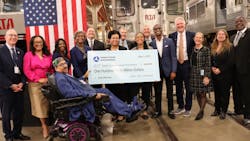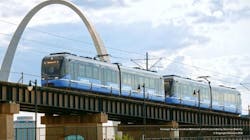FTA awards more than $700 million to six agencies for rail car replacement
The Federal Transit Administration (FTA) awarded $703.1 million to transit agencies in California, Florida, Illinois, Missouri, Ohio and Utah to replace rail cars. This is the first round of funding through FTA’s Rail Vehicle Replacement Program, which was a new program established under the Infrastructure Investment and Jobs Act (IIJA) . The IIJA will provide $1.5 billion through 2026 for rail car replacement projects.
The initial round of grants for the Rail Vehicle Replacement Program opened in October 2022 to support projects with funds to replace vehicles on subway systems, commuter rail and light-rail systems.
"Every day, millions of Americans rely on subways, commuter rail and light rail to get to work or school, buy groceries and see loved ones, but many railcars still in service are decades old and in need of replacement," said U.S. Transportation Secretary Pete Buttigieg. "These grants will help bring riders faster, safer, more reliable service on America’s rails."
FTA notes older rail cars contribute to service delays and increased costs and lack newer amenities, such as digital signage and audio tools that improve the riding experience. They may also lack accessibility features – such as direct access into the railcar – for people with disabilities or anyone pushing a stroller.
The Bureau of Transportation Statistics shows the average age of a commuter rail passenger coach was 25.3 years in 2021, which is a 25 percent increase compared to 2016. The average age of heavy-rail passenger cars was 23.9 years, which is a five percent increase compared to 2016 and the average age of light-rail vehicles was 19.5 years, which is an eight percent increase compared to 2016.
"One-third of our nation’s subway and commuter rail vehicles are more than 25 years old," said FTA Administrator Nuria Fernandez. "This program focuses on transit agencies that lack the funding they need to address overdue railcar replacements. We are proud to select these projects to improve passenger rail service for riders across the nation."
Projects to receive grants
The six agencies to receive grants include the Sacramento Regional Transit District (SacRT), the South Florida Regional Transportation Authority (SFRTA, operator of Tri-Rail), the Chicago Transit Authority (CTA), the Bi-State Development Agency of the Missouri-Illinois Metropolitan District (St. Louis Metro), Greater Cleveland Regional Transit Authority (GCRTA) and the Utah Transit Authority (UTA).
CTA received the largest single grant award of $200 million, more than 25 percent of available funds, to purchase up to 300 electric propulsion passenger rail cars to replace older cars that have been in operation since the 1980s. This project will improve CTA's state of good repair needs as the average age of its rail fleet is nearly 40 years old.
“Like many older transit systems, the CTA must regularly invest in modernizing its fleet to replace aging vehicles that are beyond their useful life,” said CTA President Dorval R. Carter, Jr. “Thanks to the leadership and support of [U.S. Sens. Tammy] Duckworth and [Richard] Durbin, and the entire Illinois delegation, CTA now has funding needed to begin planning and designing for the future procurement of our next-generation of railcars, which will allow us to provide our riders with safer and more reliable rail services, as well as improved technologies to make public transit a more convenient and accessible travel option.”
“This successful grant award shows a unified legislative delegation, working together to benefit Missouri and Illinois. Additionally, the Federal Transit Administration has once again stepped forward to advance transit in the St. Louis region,” said Taulby Roach, Bi-State Development president and CEO. “The regional economy is driven by public transit access to jobs, health care and entertainment. This major award means our transit system will continue to move into the future with reliable, environmentally friendly, state of the art modern trains.”
Replacing the rail cars on MetroLink will improve service reliability and state of good repair needs. Bi-State Development Agency is currently in negotiations with Siemens, which was awarded a contract for the MetroLink light-rail replacement program.
GCRTA will use its $130 million grant to buy 60 new vehicles to replace its current heavy rail fleet, which is 39 years old and its light-rail fleet, which is 42 years old. In April, GCRTA awarded a contract to Siemens for an initial order of 24 Siemens S200 rail cars, with options to order up to 60 rail cars. The news rail cars will be able to operate on both systems, which will eliminate the need for GCRTA to operate two separate fleets and safety the authority $7 million annually.
“This grant award represents a tremendous investment in Greater Cleveland and prepares us for the future of rail transportation with the latest advances in rail car technology,” said Dr. Floun’say Caver, GCRTA’s chief operating officer. “With these funds, we can increase our initial order of 24 new rail cars, thereby improving the customer experience and expanding the number of train routes in our system.”
GCRTA says the total rail replacement program will cost $393 million of which the authority had previously secured $213 million in various state and federal funding, as well as through the authority’s reserve fund.
SFRTA was awarded a $71.7 million grant that will support the replacement of 24 rail vehicles, which represents 32 percent of its fleet. The funding will be used to purchase new locomotives and passenger cars that have exceeded or are near the end of their useful life. FTA says the project will ensure safe, reliable and efficient transportation for Tri-Rail's 12,500 daily riders.
“We are overjoyed to receive this magnificent news as it represents a momentous occasion for the future of this agency,” said Commissioner Raquel Regalado, SFRTA Governing Board chair. “We will not only be better prepared to expand the system, but our regular passengers will have a much-improved passenger experience when we procure new equipment with state-of-the-art technology.”
UTA was awarded a $60 million grant to purchase 20 new light-rail vehicles to replace older vehicles. The project will improve service reliability, safety and significantly improve accessibility for riders.
SacRT will use its $45.1 million grant to purchase 16 new light-rail vehicles to replace older vehicles that have exceeded their useful life. This project will improve the agency's state-of-good repair needs and service reliability for the region's 1.7 million residents.
SacRT previously purchased 28 low-floor light-rail trains from Siemens Mobility and has a contract to order up to 76. Those vehicles are currently undergoing a testing process before they can be put into service early next year. With the order of an additional 16 new low-floor trains, SacRT will have 44 new low-floor vehicles, which is close to two-thirds of all the vehicles needed to operate on its light-rail system.
“This significant funding award will help accelerate SacRT’s light-rail modernization program and puts us one step closer to replacing our aging light-rail fleet with entirely new and modern, low-floor vehicles that will improve accessibility for all riders. These new vehicles are being built by Siemens, right here in Sacramento, so this is also a significant boost to the economic prosperity of the region,” said SacRT Board Chair and Sacramento County Supervisor Patrick Kennedy.
Summary of the Rail Vehicle Replacement projects to be awarded grants:
- Chicago Transit Authority awarded $200 million to purchase up to 300 electric propulsion passenger rail cars.
- Bi-State Development Agency awarded $196.3 million to purchase up to 48 light-rail vehicles.
- Greater Cleveland Regional Transit Authority awarded $130 million to purchase 60 vehicles to operate on both its light-rail and heavy rail systems.
- South Florida Regional Transit Authority awarded $71.7 million to purchase 24 vehicles.
- Utah Transit Authority awarded $60 million to purchase 20 light-rail vehicles.
- Sacramento Regional Transit District, $45.1 million grant to buy 16 light-rail vehicles.
About the Author

Mischa Wanek-Libman
Group Editorial Director
Mischa Wanek-Libman is director of communications with Transdev North America. She has more than 20 years of experience working in the transportation industry covering construction projects, engineering challenges, transit and rail operations and best practices.
Wanek-Libman has held top editorial positions at freight rail and public transportation business-to-business publications including as editor-in-chief and editorial director of Mass Transit from 2018-2024. She has been recognized for editorial excellence through her individual work, as well as for collaborative content.
She is an active member of the American Public Transportation Association's Marketing and Communications Committee and served 14 years as a Board Observer on the National Railroad Construction and Maintenance Association (NRC) Board of Directors.
She is a graduate of Drake University in Des Moines, Iowa, where she earned a Bachelor of Arts degree in Journalism and Mass Communication.

